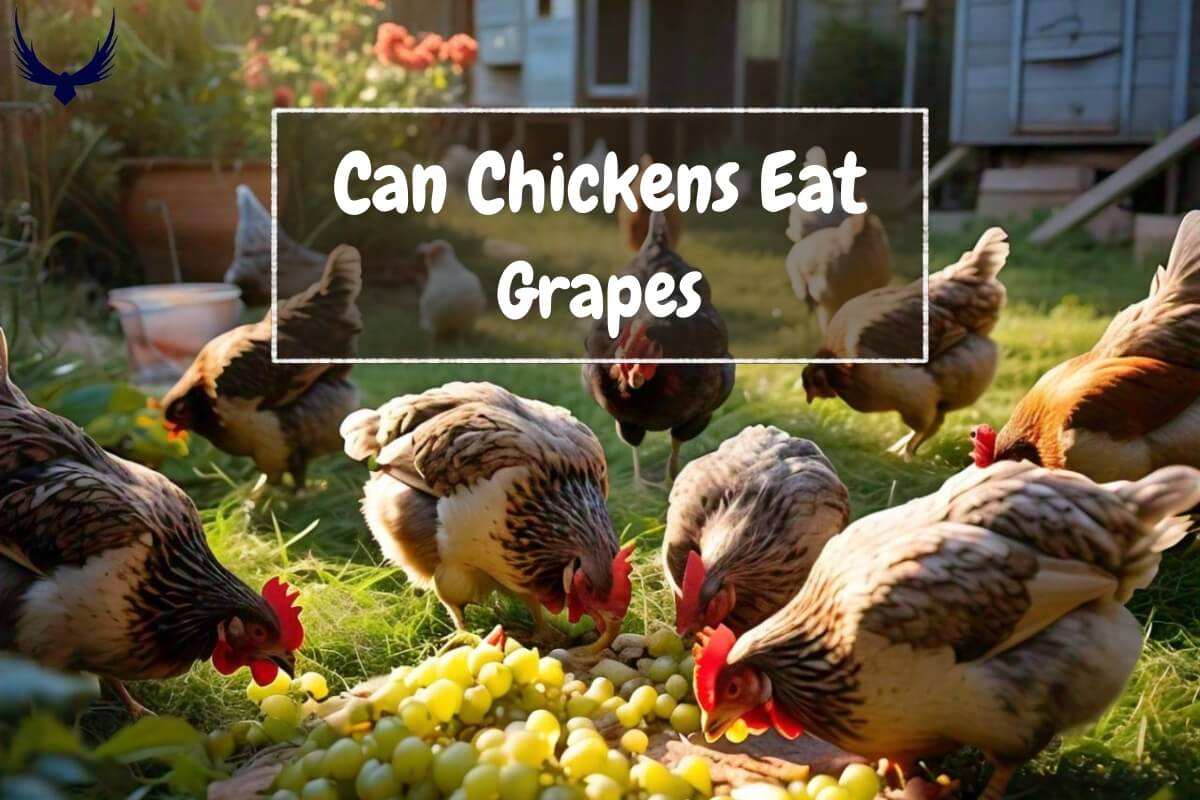Chickens like to eat different foods, and grapes can be a topic of debate among chicken owners. Some people wonder if it’s safe for chickens to eat grapes.
Let’s find out Can Chickens Eat Grapes Safely without causing any problems.
Can Chickens Eat Grapes?
Chickens can safely eat grapes as part of a balanced diet. Grapes provide vitamins, minerals, and antioxidants that help chickens to stay healthy. It’s safe for chickens to eat the skin and flesh of grapes but remove the seeds because they might have toxins.
Grapes should be offered in moderation due to their high sugar content. It’s best to cut grapes into smaller pieces to prevent choking.
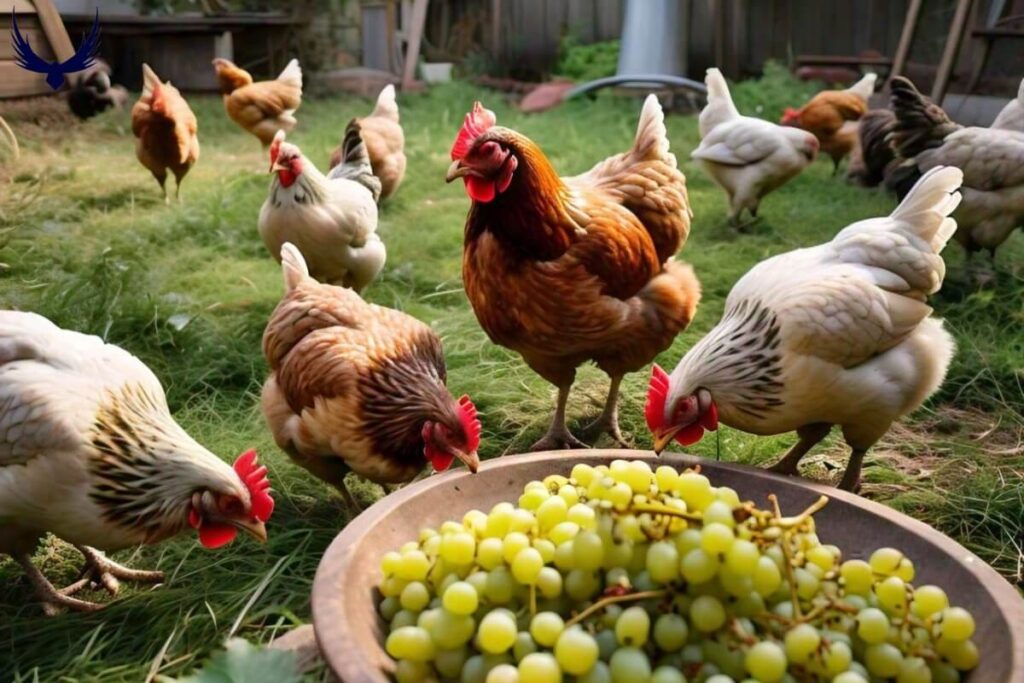
Grapes should not replace the chickens’ primary diet of balanced poultry feed. Offering a variety of fruits and vegetables including grapes can provide additional nutrients for chickens. It’s important to maintain proper nutrition and not overindulge them with treats.
Nutritional Benefits of Grapes for Chickens
Following are the nutritional benefits of grapes for chickens:
Vitamins
Vitamin C: It boosts the chicken’s immune system and helps in stress management.
Vitamin K: It aids in blood clotting and bone metabolism.
Vitamin B1 (Thiamine): It supports nervous system function and energy metabolism in chickens.
Vitamin B2 (Riboflavin): It is important for growth and egg production in chicken.
Vitamin B6: It aids in protein metabolism and red blood cell formation.
Minerals
Potassium: It regulates fluid balance and muscle function.
Copper: It is essential for feather and eggshell formation.
Manganese: It supports bone development and eggshell quality.
Iron: It is crucial for oxygen transport in the chicken’s blood.
Calcium: It is important for strong bones and eggshell formation (though in small amounts).
Antioxidants
Resveratrol: A powerful antioxidant that has anti-inflammatory properties for chickens.
Flavonoids: It helps to protect chicken cells from oxidative stress.
Anthocyanins: It is found in red and purple grapes; these may support heart health.
Other Nutrients
Fiber: It aids in digestion and chicken gut health.
Water: Grapes have high water content, which can help with hydration.
Additional Benefits
- Grapes are low in fat and calories, making them a healthy treat option.
- Grapes have small amounts of protein which is essential for muscle development and egg production.
- The variety of nutrients in grapes can contribute to overall feather health and sheen.
What Parts of Grapes Can Chickens Eat?
Following are the parts of grapes that chickens can eat:
Grape Flesh: Grape’s flesh is safe and nutritious for chickens. They contain vitamins, minerals, and antioxidants. Chickens of all sizes can easily eat the flesh of grapes, which is the main edible part.
Grape Skin: Chickens can eat grape skin safely. Red and purple grapes have lots of antioxidants. Some chickens might find grape skin a bit tough to digest but it’s okay.
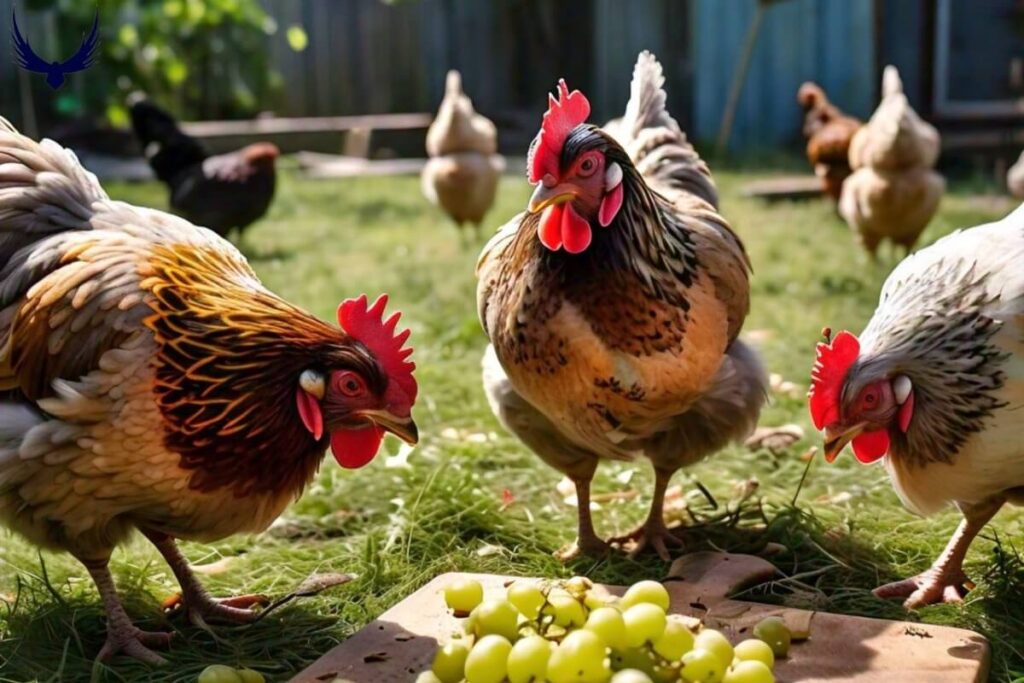
Grape Stems: Grape stems are not toxic but not very nutritious. Chickens usually ignore them. You can leave them on if giving whole grape bunches, but it’s better to remove them.
Grape Seeds: Grape seeds are small seeds found in some types of grapes. They are safe in small amounts and have some nutrients and beneficial compounds. It’s better to give seedless grapes or take out seeds from bigger grapes to avoid any problems.
Grape Leaves: Grape leaves are safe for chickens to eat. They have some nutrients, but not as many as the flesh. You can give them to your chickens if they are still attached to the grape bunch.
How to Feed Grapes to Chickens?
Here is the guide on how to feed grapes to chickens including preparation and serving methods:
Preparation
Washing: Thoroughly rinse grapes under cool running water. Use a mild vegetable wash if worried about pesticides. Dry grapes gently with a clean towel.
Cutting: Cut grapes into smaller pieces for chicks. For bigger chickens, whole grapes are fine, but cutting them can prevent choking. Remove any stems if present.
Seed removal: Remove seeds from grapes to avoid problems. Seedless grapes are a better option for chickens.
Serving Methods
Hand-feeding: Offering grapes directly to chickens by hand allows you to monitor their eating habits and behavior. This helps to build trust with your flock.
Scatter feeding: Scatter cut pieces of grapes in the chicken area to help them find food naturally. This activity keeps them mentally stimulated and active.
Mixing with other foods: Mix grapes with other foods such as fruits (Kiwi, Apple, Oranges, Bananas, and Pineapple) and Vegetables (Celery, Jalapenos, Broccoli, and Tomatoes) to introduce them to chickens who may be hesitant to try them. Chop the grapes and mix them with other treats such as Mushrooms or regular feed.
Frozen treat: Make a frozen treat by freezing whole or cut grapes. It’s a refreshing snack for hot weather.
How Often Can Chickens Have Grapes?
Frequency: Grapes should be considered an occasional treat, not a daily food. It’s good to give them to chickens 3 to 4 times a week. Adult chickens can have grapes more often than young ones. For chicks, give grapes only once a week or less until they are fully grown.
You can offer grapes more frequently during grape season when they’re fresh and plentiful. Reduce frequency when other seasonal treats are available.
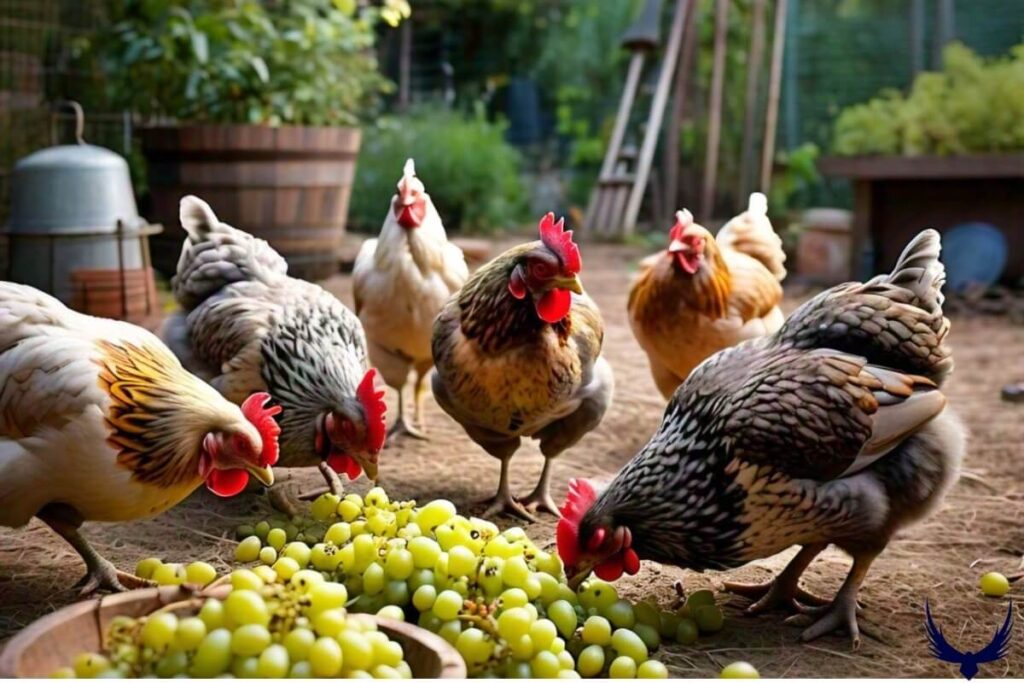
Quantity: Treats including grapes should not exceed 10% of a chicken’s daily diet. Most of their food should be balanced chicken feed. Give 2 to 3 grapes to average-sized chickens and 1 to 2 grapes to chicks. Adjust amounts based on flock size and interest in treats. Treats should not exceed 1-2% of a chicken’s body weight.
Risks of Feeding Grapes to Chickens?
Following are the risks of feeding grapes to chickens:
Choking Hazard: Whole grapes can be a choking hazard for small chickens. Cut grapes into smaller pieces before feeding them to prevent choking.
Digestive Upset: Introducing grapes suddenly or overfeeding can cause stomach problems. Symptoms include diarrhea. To prevent this, introduce grapes slowly and in small amounts.
Nutritional Imbalance: feeding too many grapes can cause a nutritional imbalance by reducing the intake of important nutrients from regular food. To prevent this, limit grapes treat to no more than 5 to 10% of your daily diet.
Seed Toxicity: Grape seeds have toxins in small amounts. To be safe, feed seedless grapes or take out the seeds before giving them to chickens.
Reduced Egg Quality: Overfeeding treats can harm egg quality. To prevent this, stick to a balanced layer feed diet.
Things to Consider Before Feeding Grapes to Chickens
Mold and Spoilage: Check grapes carefully before giving them to chickens. Discard any grapes showing signs of mold, discoloration, or unusual texture. Moldy grapes can contain mycotoxins which are harmful to chickens. Spoiled grapes may cause digestive issues or other health problems. Only give fresh, clean grapes to your chickens.
Pesticide Residue: Grapes are often treated with pesticides in conventional farming. These chemicals can be bad for chickens if they eat them often. Wash grapes thoroughly under running water to remove surface residues. Try to buy organic grapes to reduce pesticide exposure. If you’re not sure about the pesticides on grapes, feed them to chickens less or not at all.
Flock Size: When giving grapes to your chickens, think about how many chickens you have. If you have a lot of chickens, you may need to give more grapes, so everyone gets some. If you have fewer chickens, give less grapes to avoid overfeeding. Make sure all chickens can have grapes to prevent fighting.
Can Baby Chicks Eat Grapes?
Baby chicks can eat grapes but it’s best to wait until they are 4 to 6 weeks old before introducing any treats including grapes. Cut grapes into very small pieces to prevent choking. Start with a small amount like one-quarter of a grape for a few chicks.
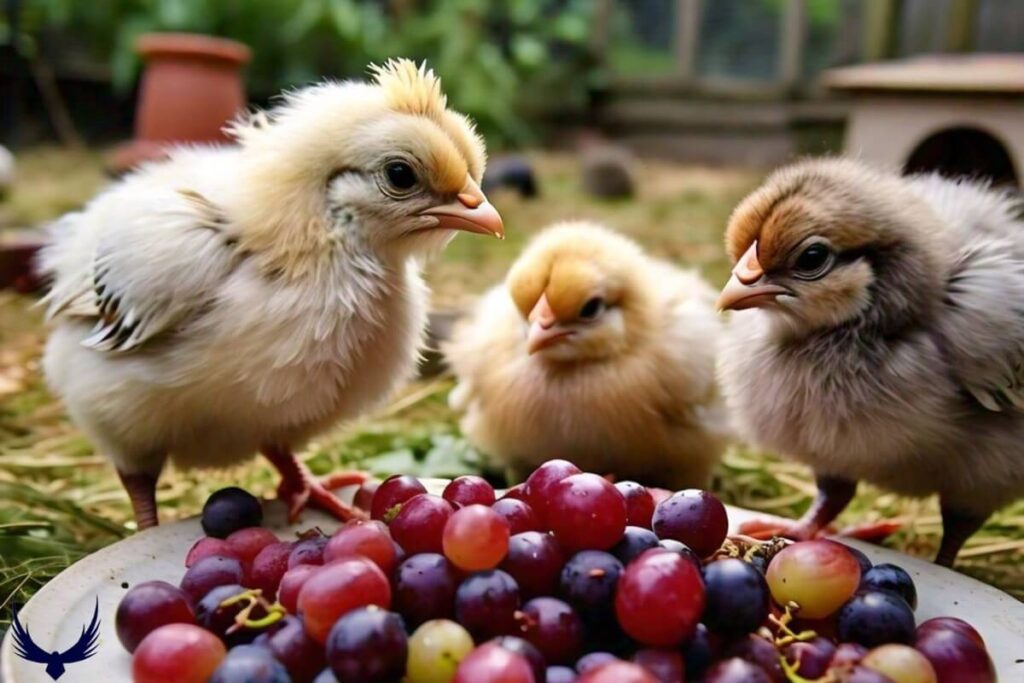
As chicks grow, you can gradually increase the amount, but grapes should always remain an occasional treat. For chicks aged 7 to 8 weeks, a small grape piece per chick once or twice a week is sufficient. Always make sure they eat their chick starter feed which has important nutrients.
Keep an eye on chicks after giving them new food and stop if you notice any digestive issues or changes in behavior.
Can Chickens Eat Grapes with Seeds in Them?
Chickens can eat grapes with seeds, but it’s safer to offer seedless grapes or remove the seeds before feeding. Grape seeds aren’t highly toxic to chickens, but they contain small amounts of compounds that could be harmful in large quantities.
Grape’s seed can pose a choking hazard for chicks. It’s better to be safe by giving seedless grapes or removing the seeds before feeding your chickens.
Can Chickens Eat Green Grapes?
Chickens can eat green grapes safely like other types of grapes. Green grapes have vitamins and antioxidants just like red or purple grapes. Feed them in moderation, cut into small pieces to prevent choking, and as part of a varied diet.
Can Chickens Eat Grape Stems?
Chickens can eat grape stems, but they usually don’t like. Grape’s stems are fibrous and offer little nutritional value compared to the fruit itself. Stems can be a choking hazard if eaten in big pieces, so it’s better to remove stems before offering grapes to your chickens.
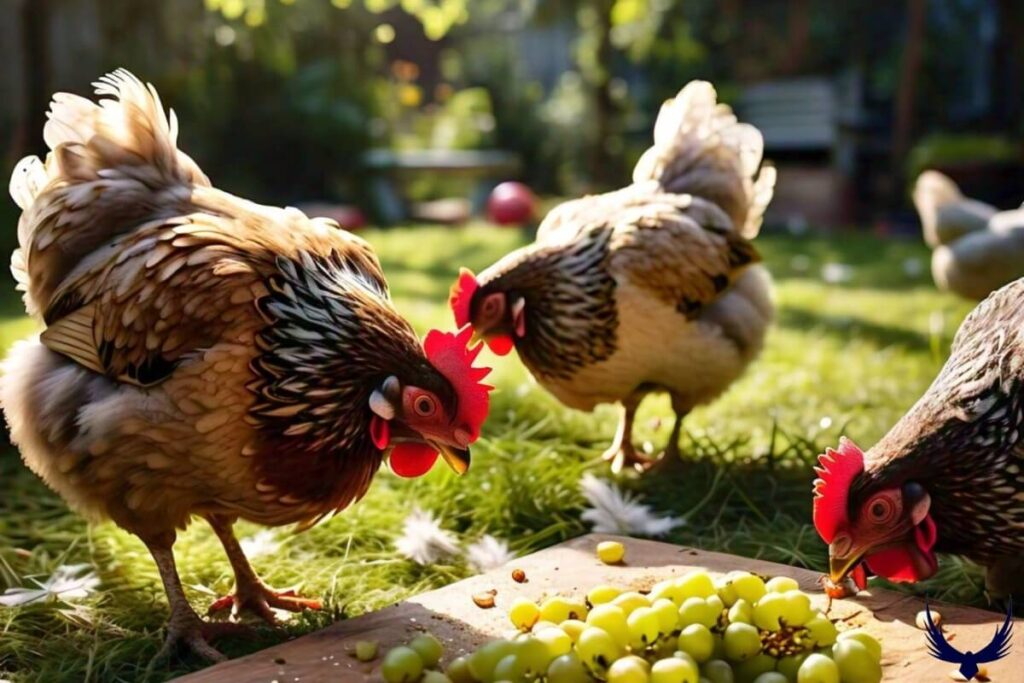
Instead, focus on giving them the tastier and healthier grape flesh and skin, focusing on feeding them the more nutritious and enjoyable grape flesh and skin.
Can Chickens Eat Grape Leaves?
Chickens can eat grape leaves as a tasty treat. The leaves have nutrients and can be part of their diet. Offer them in moderation and make sure the leaves are free from pesticides or other chemicals before feeding them to your flock.
You can give the leaves fresh or dried, but they should not replace the main chicken feed.
Can Chickens Eat Grape Skins?
Chickens can eat grape skins without any problems. Grape skin contains a high concentration of antioxidants, especially in red and purple varieties.
The skins are not tough and easy for chickens to digest. You don’t have to peel grapes before giving them to chickens. Just give them the whole grape, skin and all.
Can Chickens Eat Moldy Grapes?
Chickens should never be fed moldy grapes or any moldy food. Mold can produce mycotoxins which are harmful to chickens and can cause serious health issues including respiratory problems, organ damage and even death. Always discard any moldy grapes or other spoiled food items.
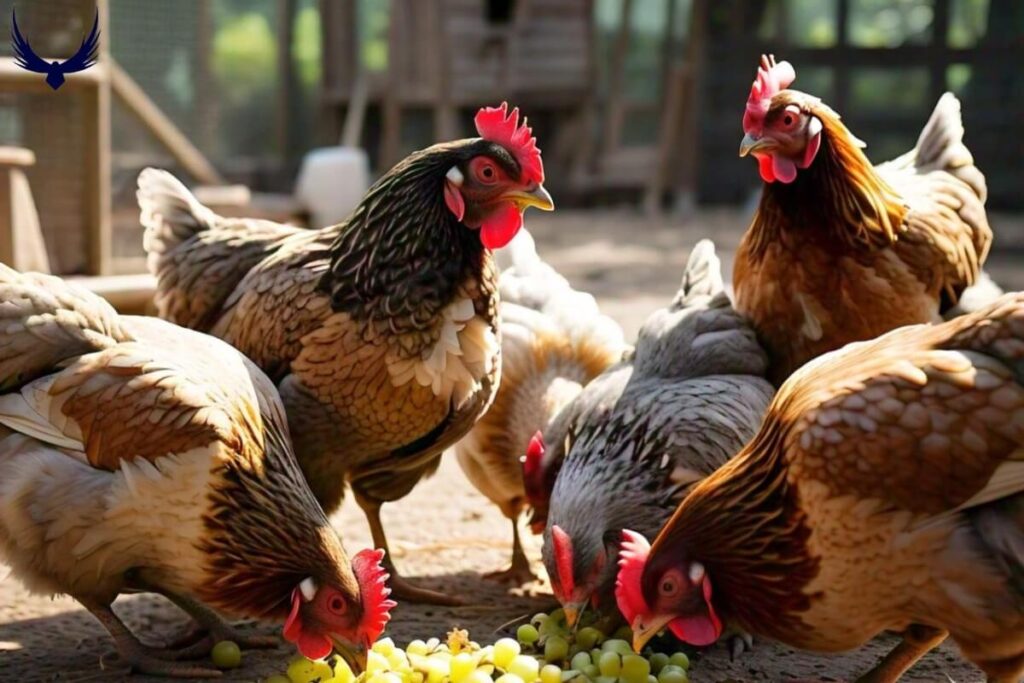
Give chickens fresh, clean grapes and take away any uneaten fruit after a few hours to prevent spoilage.
Are Grapes Good for Chickens to Eat?
Chickens can enjoy grapes as a healthy snack in small amounts. Grapes have vitamins, minerals, and antioxidants that help keep chickens healthy.
When given in moderation, grapes can provide nutrition and be a fun snack for chickens. Grapes are high in sugar, so they shouldn’t be a regular part of a chicken’s diet.
FAQs – Can Chickens Eat Grapes Fruit
Do Chickens Like Grapes?
Chickens like eating grapes as a treat because they are safe and have nutritional benefits. Since grapes are high in sugar, they should only be given in small amounts and in small pieces to prevent choking.
Can Chickens Choke on Grapes?
Chickens can potentially choke on whole grapes, especially smaller breeds or younger birds. The size and round shape of grapes make them a choking hazard if swallowed whole. To minimize this risk, it’s recommended to cut grapes into smaller pieces before feeding them to chickens.
Can Chickens Eat Raisins?
Chickens like eating raisins as a treat. Raisins are dried grapes that give them lots of energy and nutrients. But raisins have higher sugar content, it’s best to give chickens in small amounts, less often than fresh grapes. Always provide fresh water when feeding raisins or other dried fruits.
Can Chickens Have Grape Vines?
Chickens can safely eat grape vines in moderation. The leaves and tendrils are non-toxic and can provide some nutritional benefits including vitamins and fiber. It’s important to ensure that any vines given to chickens are free from pesticides or other harmful chemicals.
Can Chickens Eat Grapes Whole?
Adult chickens can eat whole grapes but it’s safer to cut them into smaller pieces. Cutting grapes into smaller pieces reduces this risk and makes it easier for chickens to eat. Whole grapes can be a choking hazard for younger chickens.
Can Chickens Eat Grape Jelly?
Chickens can have grape jelly sometimes but it’s not good to give it to them often. Grape jelly has a lot of sugar and is low in nutritional value, which can cause health problems if consumed frequently. Also, sweet jelly might attract pests to the chicken coop. It’s best to give chickens fresh fruits or veggies as treats instead.

